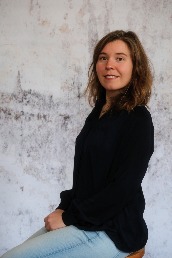PhD defence Bianca Dijkstra

Multilingualism in the Dutch logistics sector
International truckers transport goods all over Europe. But how do you get the job done when your interlocutor speaks in a different language than you? Bianca Dijkstra, PhD at the University of Groningen/Campus Fryslân studied how Polish international truckers and Dutch warehouse workers manage the multilingualism in their work environment, and which ideologies about language play a role in that. Dijkstra will be awarded a PhD for her research on 28 April.
It is posssible to follow the defence online via the livestream.
The programme is:
-
13.30-13.50 -- Layman's talk
-
14.00-15.00 -- Public defense ceremony
-
15.00-16:30 -- Reception & Drinks
‘Logistics professionals need to arrange all the practical details of a transport while under time pressure, and often without having a language in common. Furthermore, these logistics professionals often have not met before, and so they cannot fall back on an existing working relationship or shared knowledge about the situation. And yet if they work together, they can still get the job done’, says Dijkstra. For her research she cooperated with logistics service providers from the Northern part of the Netherlands.
Strategies for communication
The logistics workers know from experience which words, phrases and gestures are clearest for the drivers that come into their office. They structure their initial communication according to a routine of highly similar word choice and gestures, to make their message clearer for the trucker. In addition, various objects served as visual support for the shared information. The visual modes (gestures, objects) became increasingly important during unexpected events and in cases when interlocutors did not speak each other's languages (fluently). The most important factor for a successful outcome is the willingness to communicate with an interlocutor, also when that becomes more difficult.
Differing language ideologies
Not all the participants in Dijkstra’s study had the same beliefs about what would be the best, or ideal, way to handle multilingualism in a work environment. Some truckers managed the multilingual aspect of their work through a `minimalist multilingualism' approach. These participants built a highly diverse linguistic repertoire of a few words and phrases in several European languages: just enough to get by in a standard situation. However, many truckers, and Dutch logistics workers alike, had the opposite (monolingual) perspective that it would be best to use one central language within the European logistics sector. Most participants preferred English, which has a dominant position in the logistics sector, for this role. Unfortunately, this option is not always available, as not every logistics professional is fluent in English. Nonetheless, the participants' linguistic repertoires were usually sufficient, especially when paired with gestures and body language.
Bianca Dijkstra
Bianca Dijkstra’s experiences in the corporate sector sparked her passion for multilingual communication in the workplace. She studied Multilingualism at the University of Groningen and started her PhD research at Campus Fryslân in 2017. The title of the thesis she will defend on 28 APril is: Multilingual Communication Strategies in the Workplace: An Ethnographic Study of Practices and Ideologies in Logistics.
